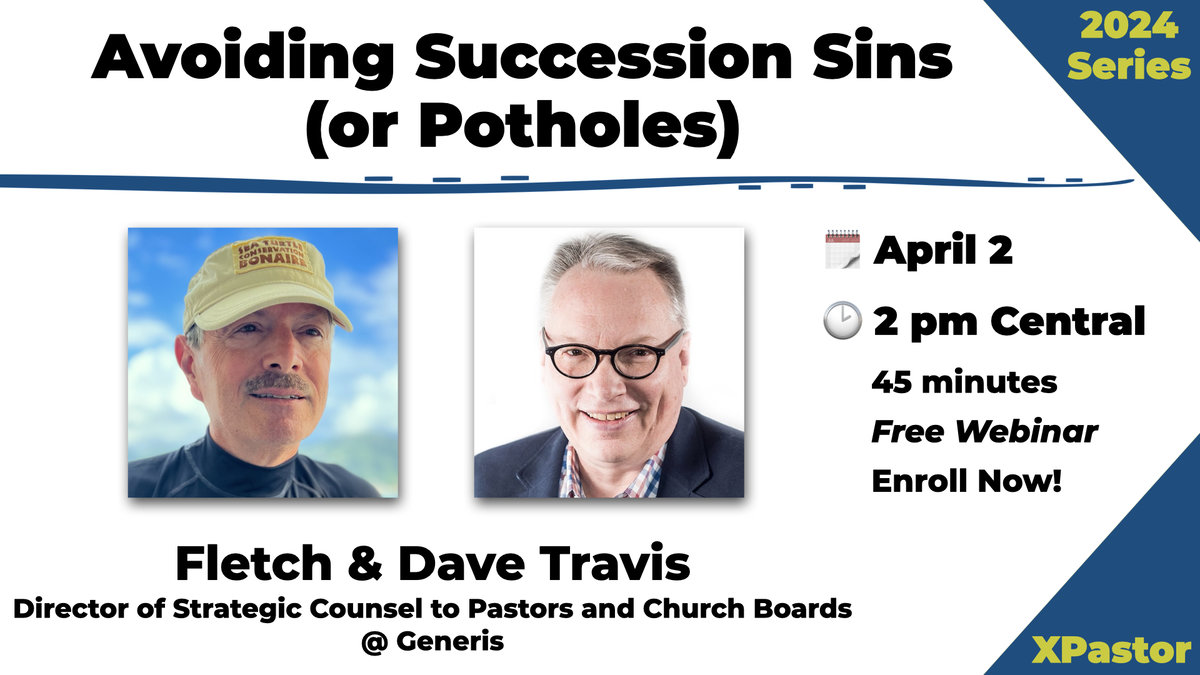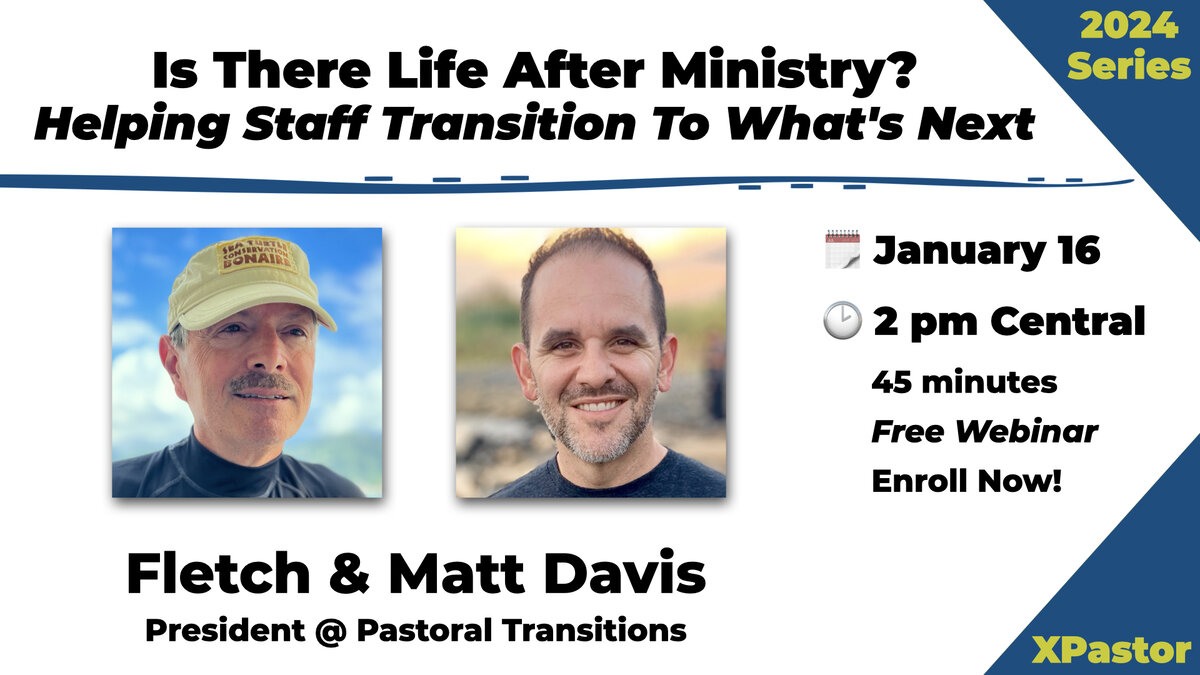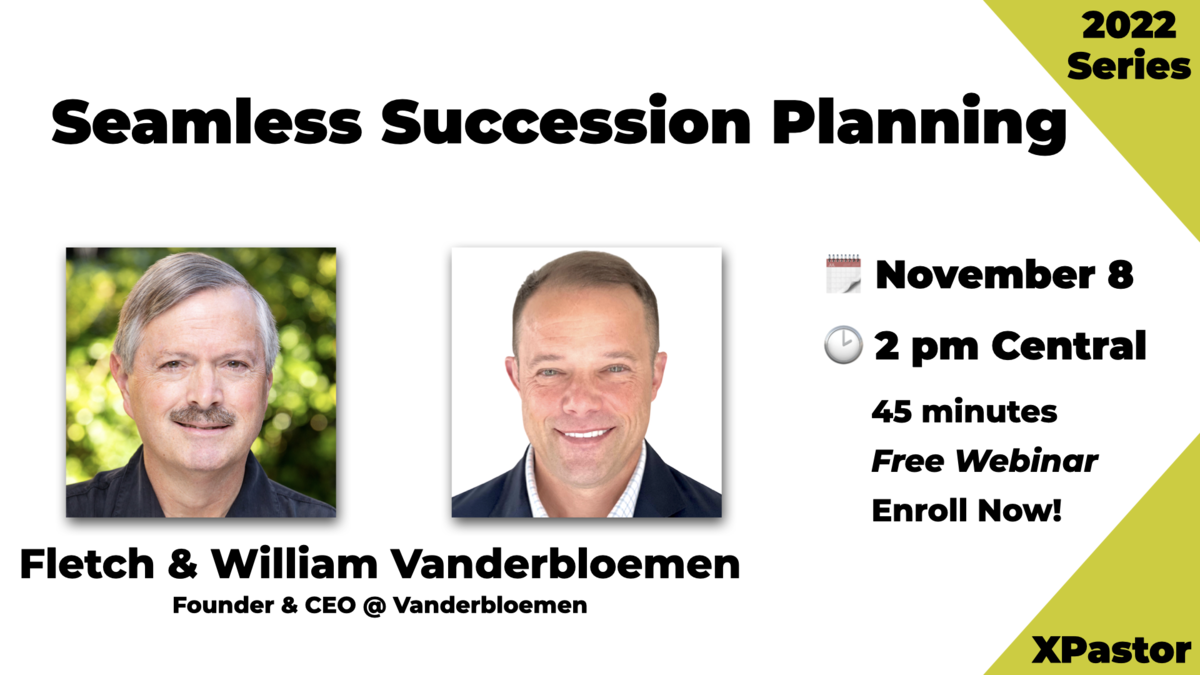When I was a pastor, I would have days where I thought I was the luckiest person on earth. Standing in front of a couple renewing their wedding vows, preaching a message I was passionate about and the people got it, or even taking my shift at the dunk tank at the Fall Festival. You know where this is going. Sometimes, I wanted out. Dealing with the conflict, carrying the burdens, never being able to shut it all down, there were times of daydreaming about, What would it look like if I wasn’t doing this anymore?
And then I didn’t have to imagine it, I found myself living it. I was no longer in pastoral ministry and I saw two different realities.
A question that lingers in the hallways of church offices and in the hearts of many pastors is, Is there life after vocational ministry? Ministry work is more than just a job. It’s a calling that intricately makes its way into one’s identity, community, and sense of purpose.
What happens when a ministry leader steps away from this calling, or is asked to step away from this calling? Is there life after ministry? Is there ministry after ministry? Indeed, the answer is a resounding Yes! The approach to these transitions can make a profound difference.
The decision to transition out of a pastoral role often comes with a mix of emotions—grief, uncertainty, but also hope for a new beginning. Whether it is initiated by the organization or by the pastor, the transition represents a whole-scale change of life, not simply heading down the street and filling out an application for a new job.
While much has been written about church leadership transitions, the focus is often on how to welcome a new pastor, rather than how to care for the outgoing one. In this article, let’s explore this topic, emphasizing not only the impact on the outgoing ministry leader, but also the ripple effect that these transitions can have on their families, remaining staff, and the congregation.
The Missing Link in Ministry Exits
It’s common in the corporate world to provide departing executives or employees with outplacement services, such as career coaching and psychological support. In the realm of ministry—a role that carries both professional and deeply personal responsibilities—such services are far less common. There is no common ethos of Kingdom Outplacement Services. It’s precisely in these ministry contexts, where comprehensive support during transitions can have a life-altering impact.
Good intentions on the part of church boards or leadership teams are important, but insufficient. The tangible impact of a leader’s exit can reverberate through not just their own lives, but their families and communities as well.
The 3 C’s of Pastoral Transitions
Before diving into the complex emotions and logistics that come with pastoral transitions, let’s talk about the three critical areas of support that every outgoing ministry leader needs—Career, Coaching, and Counseling. These 3 C’s provide a comprehensive framework for understanding the unique challenges that pastors face when transitioning out of ministry, ensuring they are well-equipped for a season of change.
Career: Transitions often create a fog around what comes next. The average pastor takes approximately a year to find a new job, many times changing fields entirely. Transitioning from a pastoral role often requires substantial career support, particularly when navigating secular job markets.
It’s important for outgoing ministry leaders to undergo assessments to gain critical insights into their transferrable skills and professional inclinations. Learning how to effectively present themselves in interviews, optimize their LinkedIn profiles for broader job markets, and write compelling resumes becomes crucial. Such career support enables them to identify new opportunities where their unique skill sets can be applied, making the transition smoother and more purposeful.
Coaching: In addition to career guidance, departing pastors greatly benefit from financial, life, and leadership coaching. Financial coaching helps them understand their financial runway, manage their 403b plans, and transition out of housing allowances. Life and leadership coaching provide a framework for identifying new roles, building strong relationships, and aligning their future with their core values.
Finally, spiritual formation may be the most crucial element of coaching services. Pastors often focus so much on the spiritual needs of their congregation that they neglect their own spiritual health. Through a lens of spiritual formation, departing pastors can become more aware of God’s presence and direction in this new and uncertain season of their lives.
Counseling: The emotional and spiritual toll of leaving a ministry role often requires more than just career and life coaching. It calls for professional counseling. Licensed Christian counselors can provide a safe space for outgoing leaders to process their experiences, address any trauma, and work on relational dynamics that may have been strained during their ministry.
It’s not just the outgoing leaders who bear the burden of transition. Their spouses and children also experience the upheaval. Couples counseling can help strengthen the marital relationship during this challenging time, while family counseling provides an avenue for children to process their feelings and adapt to new circumstances. In essence, comprehensive counseling services attend to the well-being of the entire family, facilitating a healthier transition for everyone involved.
Challenges Facing Outgoing Ministry Leaders
- Trauma: Emotional, spiritual, and relational trauma is often felt deeply and can linger long-term.
- Loneliness: A loss of community can be devastating, as the pastor and their family often lose a support system they’ve leaned on for years.
- Finding Employment: Statistics suggest finding a new job in or outside of ministry can take significant time.
- Unemployment Benefits: Many pastors are unaware that they are generally not eligible for unemployment benefits.
- Financial Hardship: Many pastors face severe financial challenges that often require relocation.
- Spiritual Deconstruction: The exit often prompts a period of spiritual reconfiguration, which can affect an individual’s future ministry and faith journey.
Often lost in discussions about ministerial transitions are the spouses and children of outgoing ministry leaders. A change in pastoral leadership is not merely a professional shift; it’s a complete upheaval of life as they know it. Spouses may lose their roles in the ministry and community, and children are uprooted from their social circles and routines. The emotional and psychological impact on them can be profound, and the wound of community loss may take years to heal.
The way a ministry leader’s exit is handled says a lot about an organization’s values and integrity. Ethical considerations and biblical principles both argue for offering a robust support system to leaders in transition, beyond merely a severance package.
The Practical Business Side of Ministry
In the corporate world, decisions to let executives go are often accompanied by rigorous risk assessments, considering all stakeholders. Similarly in the ministry context there are several key stakeholders to consider:
- Outgoing Leader and Family: As mentioned above, lives are profoundly affected on emotional, financial, and spiritual levels. The departing pastor may question their calling, grapple with identity loss, and experience financial instability. Meanwhile, the impact on spouses and children goes unaddressed.
- Remaining Staff: Beyond the loss of a colleague, remaining staff members face a shaken organizational culture. What was once described as a healthy culture of transparency now feels obscured by unanswered questions and the feeling of injustice. The remaining team may feel like they’re walking on eggshells, questioning leadership decisions, and even their job security.
- Congregation: The pastor has ministered to families in good times and bad, officiating weddings, sitting with them in the hospital, leading to a memorial service, walking them through the loss of a marriage or job. The impact a minister has on their people is deep. When the congregation feels that pastor is being sidelined or removed without love or grace, the torches come out. Seeds of division are sown. People may leave quietly at best, or get vocal, taking others with them.
- God: Yes, even the Almighty is a stakeholder. The manner in which churches handle transitions can either honor or dishonor Him. It tests the commitment to biblical principles of love, forgiveness, and community.
If not managed well, a pastoral transition can cost a ministry far more than anticipated. Anger and division within the congregation can lead to reduced giving, and a loss of members means fewer resources for mission and outreach. Worse, the social capital of trust and community is depleted, sometimes irrevocably. Don’t believe this? We’ve seen it, and you have at least heard about it.
An Alternative Approach
Imagine a scenario where the outgoing pastor is honored with grace. The transition is managed as an investiture into their future, rather than a termination. An announcement from the pulpit might go something like this:
We love this pastor deeply and care about what’s next for them, as much as we care for the ongoing vitality of our church community. That’s why we’ve contracted with an organization to closely work with them over the next six months to ensure their success and emotional well-being.
The result?
- The torches are put away.
- The anger dissipates.
- The gossip disappears.
Everyone can breathe a collective sigh of respect and relief, thankful for the compassion extended by leadership.
A Wise Investment
Ministry boards that skimp on providing adequate transition services are being penny-wise and pound-foolish. The initial cost of providing comprehensive support and grace far outweighs the long-term financial and social costs of a poorly managed transition. It’s an investment not just in the outgoing leader, but also in the collective heart and soul of the ministry community.
The cost of handling a transition poorly can be catastrophic, resulting in division and a long-term loss of trust. But doing it right is an investment—in the outgoing leader, in the community, and in the very mission of the church. Let’s not forget that compassion and empathy will always win the day.
Empathy wins and loses hearts, affects political elections, impacts business leadership, and even shapes the success of non-profit organizations. From boardrooms to living rooms, from pulpits to public squares, empathy has the power to either unify or divide.
In ministry settings, where people’s spiritual lives are at stake, the currency of empathy gains even greater value. It’s a universally positive force that can’t be overvalued. In the end, no one has ever looked back and regretted showing too much compassion. So when facing a challenging pastoral transition, remember that the initial investment in empathy and compassion will yield long-term dividends in trust, loyalty, and community well-being.
Plus, it’s a biblical imperative:
Therefore, as we have opportunity, let us do good to all people, especially to those who belong to the family of believers.
Galatians 6:10
How Do We Do This Better?
In summary, the road to life after vocational ministry may be filled with challenges. It doesn’t have to be a path walked alone or in a way that sacrifices the well-being of all involved. Considerate, compassionate transition planning can uphold everyone’s dignity, from the outgoing pastor and their family to the congregation and beyond.
If you’re seeking additional resources and real-life stories that offer more insights into this transitional phase, our team at Pastoral Transitions has recently launched a podcast called, Life After Ministry. It aims to serve those in the midst of these complex transitions, as well as the decision-makers wrestling with how best to handle them.
Is there life after vocational ministry? Absolutely. More than that, there’s the potential for a fulfilling and meaningful life ahead. Yet, how the church as an institution and community handles these transitions makes a significant difference.
In addition to fulfilling our Christian duty to love one another, as I have loved you, a graceful transition process can leave a lasting legacy of compassion, faithfulness, and integrity. These are not only markers of a healthy community, but also powerful testimony to the grace we profess.
Let’s be the change we wish to see in these sensitive, yet incredibly significant, pastoral transitions.











